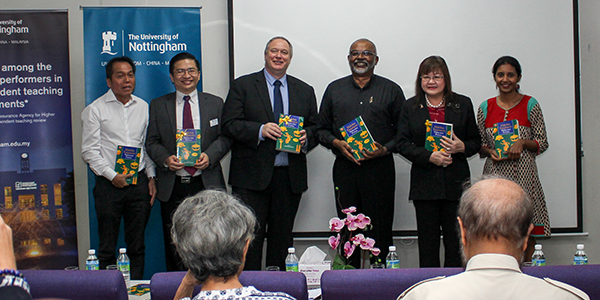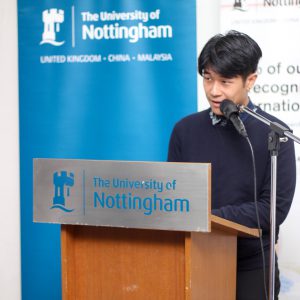
January 4, 2017, by Communications
Reading at Malchin Testament Launch
Prior to last Friday’s launch of Malchin Testament, Professor Malachi invited my coursemates and I to read works of late Malaysian poets Hilary Tham, Ee Tiang Hong and Omar Mohd. Nor. Since Michelle Beth and I have been studying the works of Malaysian poets closely as part of our course, we were elated and honoured (and nervous) to be reading among a lineup of established poets present that morning, which included UNMC’s own academicians: Shivani Sivagurunathan, Chuah Guat Eng, Elizabeth Marshall, Sheena Baharudin and Bernice Chauly.
As an English student and a budding writer, I reflected upon a few things during the event. Here is a gathering of Malaysian writers who share a special and, I may go as far as to say, a mystical bond — an unspoken mutual understanding of one another. The nature of the writer’s craft is distinct from the mechanics of other professions yet, paradoxically, it is indefinable. I suppose what I’m trying to get at is the connection we shared in that room of writers; it’s like a frequency, and we were running on the same wavelength.
 I was also fascinated by the cross-generational interaction that involved early poets like Muhammad Haji Salleh and Wong Phui Nam, younger poets like Jamal Raslan and Sheena Baharudin, the generations in-between, and the generation of future poets to come.
I was also fascinated by the cross-generational interaction that involved early poets like Muhammad Haji Salleh and Wong Phui Nam, younger poets like Jamal Raslan and Sheena Baharudin, the generations in-between, and the generation of future poets to come.
If you’re curious about the history of Malaysian poetry written in English, Professor Malachi in his paper, Towards a Literary Tradition: Malaysian Literature in English, observes that poetry is a popular genre among Malaysian writers in English.
Over the span of six decades since the emergence of first-generation Malaysian writers in English during the 50s, our literary scene has seen the rise of more poets: from Shirley Lim and Cecil Rajendra in the 60s; Salleh ben Joned and Kee Thuan Chye in the 70s; Bernice Chauly and M. Shanmughalingam in the 80s; later poets like Shivani Sivagurunathan and Elizabeth Marshall who published in the 2010s.
I felt fortunate to have the opportunity to exchange words with our pioneers — a transference of words like the cleric’s blessing that will keep my generation and I as we carry on the Malaysian literary tradition in English.
It was an encouragement and assurance for me to hold writing as my companion, to seriously consider publishing my work, and to embrace the identity of a Malaysian writer. Malchin Testament, drawing together the works of established poets over the years, is significant in reflecting “Malaysians’ use and ownership of the English Language,” as Professor Malachi states in his introduction to the anthology. I see this as a call for future writers to explore this fertile ground, to innovate and push political boundaries in cultivating the growth of literature.
This article is written by Jonathan Sim, third year student from the School of English.
-
Post a comment
